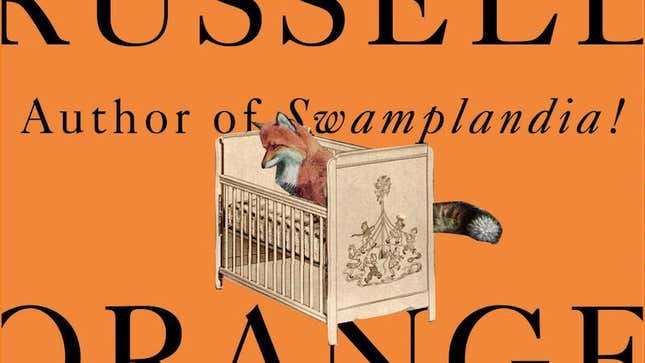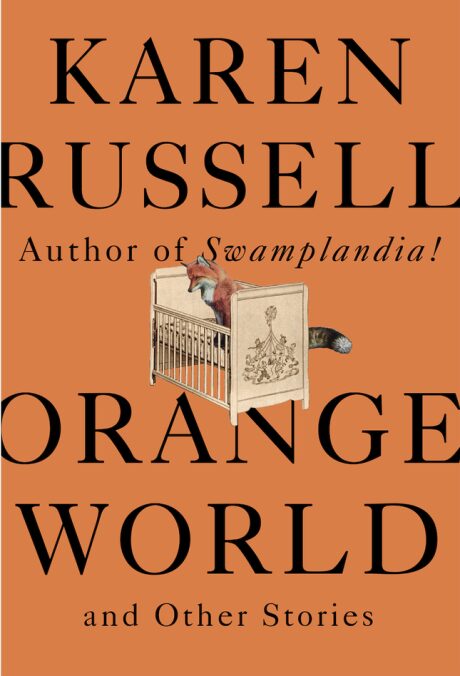'It All Feels Pretty Marvelous and Strange': Karen Russell on Florida, the Surreal, and Orange World
BooksEntertainment

Two women survive a night at a haunted ski resort, mutant sisters navigate a post-apocalyptic Florida, a young woman is possessed by a Joshua tree, a bog girl is transformed into modern girlfriend, and a mother makes a deal with a devil—these are the women who inhabit the stories in Karen Russell’s new collection Orange World and Other Stories. For those already acquainted with Russell’s work, the surreal characters and inventive settings of Orange World will be a welcome addition to her fantastical literary landscape, already populated by alligator wrestlers, wolf-girls, and vampires. And in Orange World, as with her previous work, Russell uses the surreal to lay bare the anxieties and fears of modern life.
In “The Prospectors,” two young women conning their way through the Great Depression find themselves alone, abandoned at a buried resort turned graveyard, inhabited by the ghosts of men who met their deaths at the site. The women perform a strange choreography, nervously placating the egos of dead men in hopes of surviving and avoiding violence. The women band together, just as the four mutant sisters of “The Gondoliers.” Raised in “New Florida” the girls sing to each other as they echolocate through the drowned, post-apocalyptic landscape of Miami. And, in “Orange World,” a new mother is beholden to an evil force, saved only by other mothers who recognize the devil (or, in this case, “a devil”) as a weak parasite manifested by guilt and uncertainty.
In this collection, difficult realities are refracted through ghosts and mutants, but they still retain their potency. Russell’s greatest skill has always been that she can transport anxieties and seemingly inescapable realities into the realm of the uncanny, making readers reexamine them with renewed empathy and even with a sense of eager humor. That’s particularly true throughout Orange World. Ghosts are terrifying, but so is sexual assault; climate change is looming but perhaps survival takes more imagination; a person plagued by rumors and lies is hollowed out like zombie; the people we love can be unknowable.
I spoke to Russell about apocalypses, landscape, and (inevitably) Florida. Our conversation has been edited for length and clarity.
JEZEBEL: What always strikes me about your writing, and particularly with these stories, is that it’s very tied to landscape. In Orange World, there’s a post-apocalyptic Florida, Northern European bogs, Joshua Tree National Park, and these landscapes define your characters, tying them to the land. I’m wondering how you approach setting when you’re thinking up your characters?
KAREN RUSSELL: I usually start with the setting, which I think is a little different than how my friends who are writers work. In almost every case in this collection, I definitely inserted some of my previous stuff. I went to Joshua Tree National Park for the first time and I did go on a road trip with my now husband, but he would definitely want me to say that it’s not an autobiographical story. It was just such a sublime place and I felt completely resized by it—I felt so haunted by these ancient trees. There was something about the scale of it that really torqued me in a strange new pleasurable way. It just feels like there are magnets under the earth. It’s like an exciting transgression just to be there.
I saw these Quonset huts on the horizon and that’s just an interesting question: Who chose to make this place their home? They’re not getting a lot of encouraging messages from the sun and the rocks, so how did this become the place that they decided they would offer their life story?
Similarly with “Bog Girl.” A long time ago I went to Dublin and it was the first time anyone had paid for me to go abroad for a book reason. It felt very amazing to me. I went to see the bog people in a museum. I was traveling alone so I was adrenalized, like riveted to my skin in the way you are if you’re traveling alone, and I was so moved. I was surprised by how moved I was to see these bog bodies. That was years and years ago. I’m not totally sure what spun up that image in my mind. Since I had never really stomped around a bog in Northern Europe, I was also just thinking about the muck in our backyards. I grew up in South Florida and we lived by this mangrove estuary that we just called “the muck.” We would play there for hours and it had that liminal quality where surprising things were always getting washed in by the tide.
These are all places that felt very evocative to me. The geography and its landscape always generate the rest of the story. I always wonder what kind of human beings would live in these landscapes and what kind of human beings would these landscapes produce? Sometimes geography controls the plot, too. In “The Bad Graft,” I was really thinking about the strange collision of different instincts. And with “Bog Girl,” there’s really nothing better you could ask from a landscape—tannic acid and perfectly preserved thousand-year-old people. When I was working on the story, I remember reading that they had found ancient butter that was still edible. Did anyone test that claim? I have no idea, but it’s wilder than anything you can imagine, that this kind of portal exists.
-

-

-

-

-

-

-

-

-

-

-

-

-

-

-

-

-

-

-

-

-

-

-

-

-

-

-

-

-

-

-

-

-

-

-

-

-

-

-

-









































